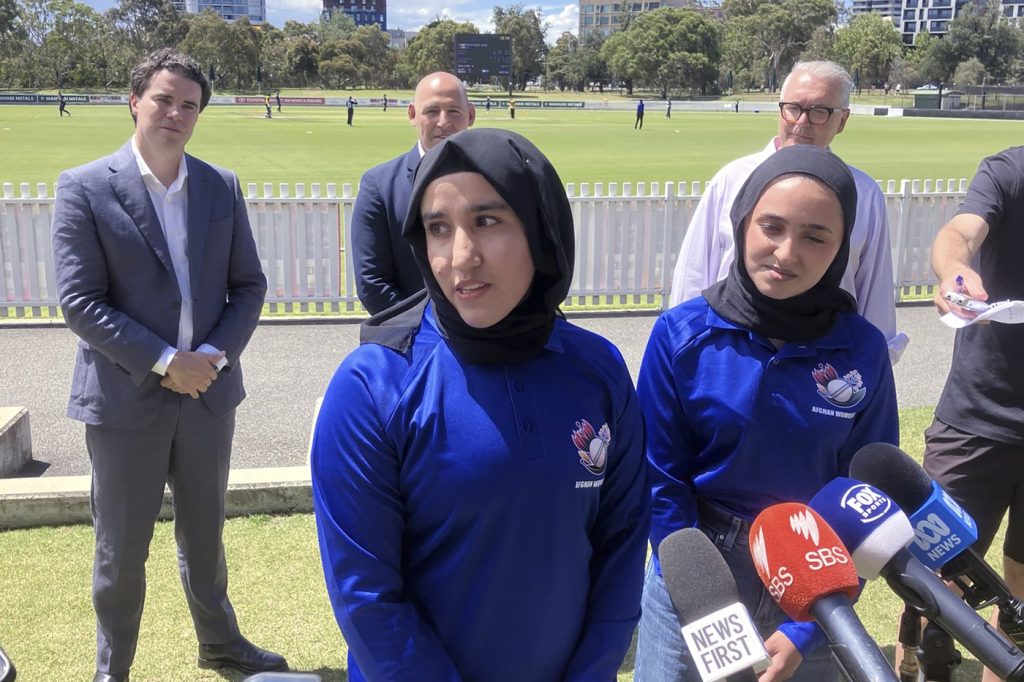MELBOURNE, Australia – Cricketer Firooza Amiri expressed the profound significance of her team’s reunion, stating that they will “represent millions of women in Afghanistan who are denied their rights.” This gathering marks the first time the Afghanistan Women’s XI has come together in over three years for an exhibition match in Australia, scheduled for Thursday at Melbourne's Junction Oval.
The match will feature an Afghanistan Women’s XI versus a Cricket Without Borders XI, consisting of 21 female players who previously held contracts with the Afghanistan Cricket Board (ACB) before the Taliban regained control of Afghanistan in August 2021. Following their escape from Afghanistan, these women cricketers have settled in Canberra and Melbourne, where they have participated in local club competitions.
Amiri, alongside Nahida Sapan, the captain of the Afghanistan Women’s XI, expressed gratitude to the Australian government and Cricket Australia for their support in promoting women's sports. Amiri noted the emotional weight of reuniting after years of loss, stating, “It’s very special for all of us to get back together after three years, leaving everything and losing everything back home in Afghanistan.” Sapan further emphasized the importance of their reunion, stating, “Together we are building not just a team. We are building a movement for change and improvement.”
This exhibition match symbolizes a historic moment for Afghan women, aiming to pave the way for greater access to education, sports, and a brighter future. Sapan shared her family’s distressing experiences, revealing they received death threats from Taliban officials, emphasizing the perilous environment they escaped, stating, “If we find you, we will not let you live.”
Cricket Australia’s CEO, Nick Hockley, commended the players for their resilience, remarking on the emotional moment the players received their team shirts with their names and numbers. “To see their playing shirts for the first time... you can see how much it means to them,” he said. Hockley reaffirmed the organization’s commitment to advocating for change on a global scale, and highlighted that Thursday’s match is merely the first step in a broader mission.
Hockley explained that the exhibition match sheds light on the unfortunate reality that, in many parts of the world, not every woman or girl has the opportunity to play sports. He stated, “We continue to advocate at the ICC and continue to engage with the ACB.” Under the Taliban regime, the ACB is unable to field a national women's team due to laws prohibiting women from participating in sports and education, which has drawn significant criticism from various global organizations.
Afghanistan remains a full member of the International Cricket Council (ICC), which typically requires member countries to have a women’s team. However, countries like England and Australia are refraining from participating in bilateral series against Afghanistan as a protest against the Taliban's treatment of women. Despite these refusals, both teams will still meet Afghanistan in ICC events, including the upcoming Champions Trophy in Pakistan.
England cricket captain Jos Buttler stated that his team should not boycott the match against the Afghanistan men’s team scheduled for February 26, while South Africa’s sports minister urged the Proteas to refrain from playing Afghanistan in the same tournament.
When asked why Australia decided to play a men’s match against Afghanistan in an ICC event but not in a bilateral series, Hockley explained that Cricket Australia was “duty-bound” to fulfill its obligations for scheduled ICC fixtures, asserting, “We’re really trying to do everything we can in our power to make a difference.”
Notably, prominent Afghanistan men’s team players, Mohammad Nabi and Rashid Khan, have publicly supported women's education via social media, after reports indicated the Taliban’s closure of nursing and midwifery training facilities.
Hockley expressed hopes that the exhibition match would become an annual event to foster dialogue and awareness around these critical issues, stating, “You need moments like this to prompt real change. The first piece is awareness.” He underscored his belief that this game would serve as a “beacon of hope” for Afghan women.










